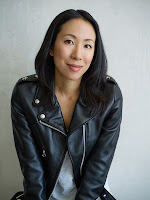There’s a reason we have the phrase “inspiration strikes.” It really does feel like lightning–something unexpected and powerful–and in the case of my debut novel, Made for You, that’s exactly how the original idea came about.
I was taking a walk during my work break, along the Chicago river, in March 2022. I’d been watching the new season of Love is Blind on Netflix and I’d just finished reading The Ones We’re Meant to Find by Joan He (highly recommend) which had put Bots that are indistinguishable from humans on my mind. As I walked, ideas collided, and I thought “oooh, what if a robot that looked exactly like a human competed on a reality TV show?” It was a no brainer to add murder.
I took my first notes that very night, without knowing who the victim would be, and who the killer–but the idea felt so compelling to me that I was determined to figure it out.
I wrote the book in a kind of fever, and the first draft was complete in 7 weeks. Though it started as ‘just’ a fun idea, writing it quickly became an incredibly cathartic experience. My youngest sister was dying of cancer as I wrote it (she died right as the book was going out on submission to editors, summer 2022), and this book became a place for me to process my grief, my questions about purpose and pain and the isolation that intense suffering brings. During the cancer years leading up to writing Made for You, I was deconstructing a lot of the assumptions I’d made about life/existence/God from the Christian point of view, and that definitely came out as I explored the main character Julia’s relationship to Andy, her creator.
This started as a fun book—and I think it IS a fun book still—but it’s also my grief book and does go to some dark places. But in a light way! Kind of. I keep describing it as “suspense candy,” and I think that in spite of the heavy themes, it’s still mostly a frothy, light, murdery page-turner.
Of course, other questions snuck their way in that were less personal and more heady–like, what makes identity? Is it a core essence that’s inalterable, or is it our choices that shape us and define us? Social issues I care deeply about also started weaving their way in–the way our culture objectifies women, the toxic dynamics of the patriarchy, and the dark side of the narrative often woven around romance that we are ‘made for each other.’ Add to that an examination of social media, our obsession with image, the pressure of ‘relatability,’ and the ethics of Artificial Intelligence as it starts to encroach on ‘human’ jobs. In short, that original lightning strike sparked in many, many directions, and I had an incredible time
Will you find answers about any of the above issues in this novel? (*laughs to self*) No. We fiction writers are lucky because, unlike our non fiction counterparts, we don’t have to actually answer the questions we pose. Our job is to just turn the prism on the issues we’re highlighting and show as many facets of a question as we can—which, for me, is the fun part.
The answers are up to you.
Made for You by Jenna Satterthwaite (Verve Books) Out now.
Hi. My name is Julia. I'm a Synth. And I'm here to find love... Julia Walden - a Synth - was designed for one reason: to compete on The Proposal and claim the heart of bachelor Josh LaSala. Her casting is controversial, but Julia seems to get her fairy-tale ending when Josh gets down on one knee. Fast-forward fifteen months, and Julia and Josh are married and raising their baby in small-town Indiana. But with haters around every corner, Julia's life is a far cry from the domestic bliss she imagined. Then her splintering world shatters: Josh goes missing, and she becomes the prime suspect in his murder. With no one left she can trust, Julia takes the investigation into her own hands. But the explosive truths she uncovers will drive her to her breaking point - and isn't that where a person's true nature is revealed? That is... if Julia truly is a person.Jenna Satterthwaite's debut novel MADE FOR YOU (published by VERVE Books) is a page-turning, twisty debut that skilfully merges artificial intelligence, psychological thriller and reality TV.
More information about the author can be found on her website. You can also find her on X @jennaSchmenna and on Facebook.































